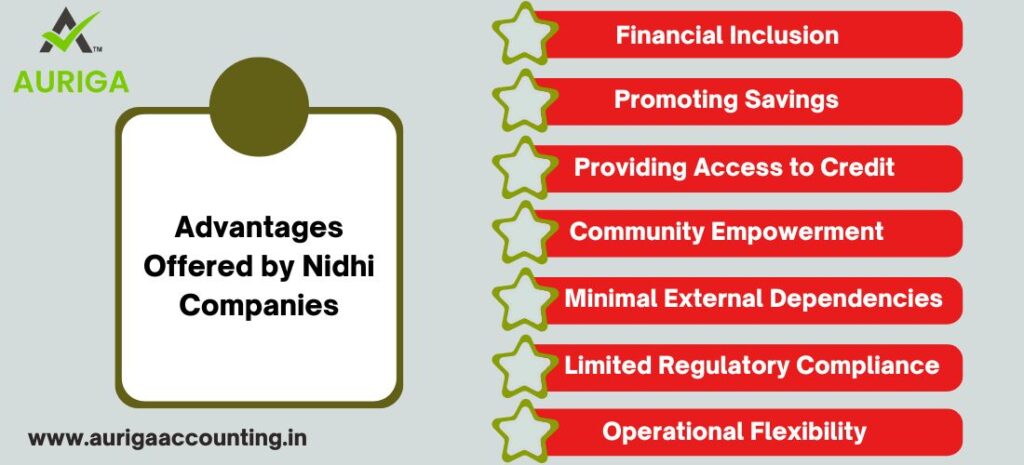
WHAT ARE THE ADVANTAGES OFFERED BY NIDHI COMPANY EXPLAIN THE CRITERIA TO REGISTER A NIDHI COMPANY IN INDIA?
Introduction
ToggleYOU NEED TO KNOW WHAT ARE THE ADVANTAGES OFFERED BY NIDHI COMPANY EXPLAIN THE CRITERIA TO REGISTER A NIDHI COMPANY IN INDIA?
Criteria to register a nidhi company in india: Nidhi Companies in India offer advantages like fostering savings habits, providing easy credit to members, and promoting financial inclusion. Advantages offered by nidhi company To register a Nidhi Company, a minimum of 200 members, net owned funds of at least Rs. 10 lakh, unencumbered deposits exceeding 10% of the outstanding deposits, and certain legal requirements must be met. Consult professionals for accurate guidance on the registration process. Visitofficialwebsite
Objectives of Nidhi Companies
The primary objectives of Nidhi Companies include:
Promoting Savings: Nidhi Companies aim to inculcate the habit of thrift and savings among their members by encouraging regular deposits.
Providing Loans: These companies offer loans to their members, particularly for small-scale business activities and personal financial needs.
Facilitating Financial Inclusion: Nidhi Companies play a crucial role in reaching underserved and financially excluded individuals, particularly in rural areas.
Ensuring Transparency: Nidhi Companies are expected to operate with transparency and fairness, ensuring that the interests of their members are protected.
Fostering Community Support: Nidhi Companies often serve specific communities or regions, which strengthens social ties and support systems among members.
In this essay, we will explore the advantages offered by Nidhi Companies and the criteria for registering one in India.
Procedure for Registering a Nidhi Company
The process of registering a Nidhi Company involves several steps, including:
Application for Name Approval:
The first step is to apply to the Registrar of Companies (ROC) for the approval of the proposed name. The name must comply with the rules and guidelines set out by the Ministry of Corporate Affairs. Once the name is approved, it is reserved for a period of 60 days.
Incorporation of the Company:
After name approval, the company must be incorporated as a public limited company. The incorporation process involves preparing the memorandum of association (MOA) and articles of association (AOA) and filing them with the ROC. Criteria to register a nidhi company in india
Application for Nidhi Status:
Following incorporation, the company must apply to the ROC for the status of a Nidhi Company. This application should include the following:
- A statement of compliance with the Nidhi Rules, 2014.
- A declaration confirming the minimum paid-up equity share capital.
- A statement indicating that the company has a minimum of 200 members.
- An affidavit from the directors or promoters stating their compliance with the Nidhi Rules.
Regulatory Filings:
The company must file the necessary documents and returns with the ROC, including the MOA and AOA, to ensure regulatory compliance.
Minimum Member Requirement:
Within one year from the date of incorporation, the company must have a minimum of 200 members to qualify as a Nidhi Company.
Capital Infusion:
The minimum paid-up equity share capital of Rs. 10 lakhs should be infused into the company and maintained. It’s important to open a bank account in the name of the company and deposit the required capital in this account.
Commencement of Business:
Upon receiving the Nidhi status, the company can commence its operations as a Nidhi Company, focusing on promoting thrift and providing loans for the mutual benefit of its members.

Advantages Offered by Nidhi Companies
Nidhi Companies offer several advantages that make them an essential part of the Indian financial landscape. These advantages cater to the needs of their members and contribute to financial inclusion, community development, and economic growth. Let’s delve into these advantages:
Financial Inclusion
One of the primary advantages of Nidhi Companies is their role in promoting financial inclusion. In India, a significant portion of the population, especially in rural areas, does not have access to formal banking services. Nidhi Companies bridge this gap by providing financial services to underserved and economically weaker sections of society. They offer a platform for individuals who are often excluded from traditional banking to save, borrow, and participate in the formal financial system. Criteria to register a nidhi company in india
Nidhi Companies reach remote and rural areas where traditional banks may not have a significant presence. This helps individuals and communities overcome the barriers of distance and accessibility, making financial services more readily available to them.
Promoting Savings
Nidhi Companies actively promote the culture of savings among their members. By encouraging regular deposits, they help individuals cultivate the habit of thrift and financial discipline. This focus on savings is vital in a country like India, where a substantial portion of the population struggles with financial insecurity and a lack of savings. Nidhi Companies provide a structured and convenient means for people to set aside money for future needs, emergencies, or investments.
Providing Access to Credit
Access to credit is a critical aspect of financial well-being, and Nidhi Companies play a crucial role in providing this access. They offer loans to their members for various purposes, including education, business, housing, and personal needs. These loans can be especially vital for small business owners and entrepreneurs who might not qualify for loans from traditional banks due to limited collateral or credit history. Nidhi Companies bridge the credit gap and enable their members to invest in their businesses or meet their financial goals. Criteria to register a nidhi company in india
Community Empowerment
Nidhi Companies often serve specific communities or regions, and this focused approach fosters a sense of community empowerment. Members of these organizations work together to promote their financial well-being and that of their neighbors. This sense of collective purpose enhances social ties and support systems within communities. It can also lead to economic growth at the local level, as Nidhi Companies often invest in micro-enterprises and small businesses within the communities they serve. Criteria to register a nidhi company in india
Minimal External Dependencies
Nidhi Companies operate on the contributions of their members, which means they have limited external dependencies for their financial activities. Unlike traditional banks, Nidhi Companies do not rely heavily on external sources of funds or deposits from the public. They are, in essence, self-reliant financial institutions, which can be a significant advantage in terms of stability and independence.
Limited Regulatory Compliance
Nidhi Companies are subject to regulations and must adhere to the Nidhi Rules, 2014, as stipulated by the Ministry of Corporate Affairs in India. While they must comply with the regulatory framework, the compliance burden is often lighter compared to that of full-fledged banks. This provides operational flexibility and allows Nidhi Companies to focus more on serving their members and communities.
Operational Flexibility
Nidhi Companies are relatively more agile and flexible in their operations compared to traditional financial institutions. They can design and customize financial products and services to suit the specific needs of their members. This flexibility enables them to be more responsive to changing economic conditions, evolving member requirements, and the dynamics of the communities they serve.
What is nidhi company? How it works?
Nidhi Company is a type of Non-Banking Financial Company (NBFC). It is formed to borrow and lend money to its members. It inculcates the habit of saving among its members and benefits. The Nidhi company registration online typically operate in the southern part of the country.
ACTIVITIES PROHIBITED IN A NIDHI COMPANY
No Nidhi shall:
(a) carry on the business of chit fund, hire purchase finance, leasing finance, insurance or acquisition of securities issued by any body corporate;
(b) issue preference shares, debentures or any other debt instrument by any name or in any form whatsoever;
(c) open any current account with its members;
(d) accept deposits from or lend to any person, other than its members;
(e) pledge any of the assets lodged by its members as security;
(f) take deposits from or lend money to any body corporate;
(g) pay any brokerage or incentive for mobilising deposits from members or for deployment of funds or for granting loans.
MEMBERSHIP
(1) A Nidhi shall not admit a body corporate or trust as a member.
(2) Except as otherwise permitted under these rules, every Nidhi shall ensure that its membership is not reduced to less than two hundred members at any time.
(3) A minor shall not be admitted as a member of Nidhi:
Provided that deposits may be accepted in the name of a minor, if they are made by the natural or legal guardian who is a member of Nidhi.
NUMBER OF MEMBERS
Minimum of seven members is required to start a Nidhi Company out of which three members must be the directors of the company.
SHARE CAPITAL
A minimum of 5 lakh rupees, is required as the equity share capital to start a Nidhi Company. Nidhi Company can’t issue preference shares.
REQUIRED DOCUMENTS FOR NIDHI COMPANY REGISTRATION
- Copy of PAN of Directors and Shareholders.
- Copy of ID Proof of Directors and Shareholders. (Voter ID, AADHAR, Driving License, Passport)
- Copy of Address Proof of Directors and Shareholders (Bank Statement/ Electricity bill/ Mobile bill/ Telephone Bill)
- Passport size Photographs.
- Property Ownership Documents of Registered office premises:
- If property is owned: Electricity bill, Ownership Documents and NOC (if required)
- If property is rented: Electricity bill , Rent Agreement and NOC
Criteria for Registering a Nidhi Company in India
Registering a Nidhi Company in India involves meeting specific criteria and following the regulatory framework outlined by the Ministry of Corporate Affairs. Here are the essential criteria for registering a Nidhi Company:
Minimum Capital Requirement:
To register a Nidhi Company in India, you need to meet the minimum capital requirement specified in the Nidhi Rules, 2014. As of my knowledge cutoff date in September 2021, the minimum paid-up equity share capital required is Rs. 10 lakhs. It’s essential to ensure that the capital is deposited in a scheduled commercial bank. Criteria to register a nidhi company in india
Membership Criteria:
To qualify as a Nidhi Company, you must have a minimum of 200 members within a year from the date of incorporation. Each member must hold a minimum of 10 equity shares or a higher number as specified in the company’s articles of association.
Name of the Company:
The name of the company must include the term “Nidhi Limited” at the end. This is a mandatory requirement for Nidhi Companies to distinguish them from other types of companies.
Nature of Business:
The primary objective of a Nidhi Company must be to promote the habit of thrift and savings among its members and to provide loans to them for their mutual benefit. Nidhi Companies are not allowed to engage in any other primary business activity. They cannot operate as chit funds, hire-purchase finance companies, or any other non-banking financial business.
Regulatory Compliance:
To qualify as a Nidhi Company, you must comply with the Nidhi Rules, 2014, as laid out by the Ministry of Corporate Affairs. These rules specify the conditions, limitations, and operations of Nidhi Companies.
Management Structure:
The management of the company must be in the form of a board of directors. The board should include individuals who meet the criteria and qualifications laid down by the regulatory authorities. Directors are responsible for the overall management and governance of the company.
Prohibition of Speculative Activities:
Nidhi Companies are prohibited from engaging in speculative activities or activities that are not conducive to the interests of their members. This restriction is in line with the core objective of promoting thrift and providing loans for the mutual benefit of the members.
Gradual Transition to Nidhi Status:
Companies seeking to register as Nidhi Companies should not have been incorporated with the main object of carrying on the business of a Nidhi. Instead, they should have been incorporated for some other purpose, and the commencement of the business of a Nidhi should be a gradual transition.
How auriga accounting help you to define advantages and explain the criteria of nidhi company
Auriga Accounting, as a financial software or service provider, can be a valuable tool for Nidhi Companies in defining and realizing the advantages and criteria associated with their operations. Here’s how Auriga Accounting can assist Nidhi Companies in this regard:
Defining and Realizing Advantages:
Financial Inclusion:
- Member Management: Auriga Accounting can help Nidhi Companies manage their member data effectively. It allows for the organization and tracking of member accounts, ensuring that financial inclusion goals are met.
Promoting Savings:
- Savings Account Management: The software can facilitate the creation and management of savings accounts, enabling members to deposit and track their savings efficiently.
Providing Access to Credit:
- Loan Portfolio Management: Auriga Accounting can assist in managing the loan portfolio, including the origination, servicing, and tracking of loans to ensure members have access to credit when needed.
Community Empowerment:
- Community-Specific Reporting: The software can generate reports that highlight the impact of the Nidhi Company’s activities on specific communities, demonstrating community empowerment.
Minimal External Dependencies:
- Self-Reliance: Auriga Accounting supports self-reliance by enabling the company to manage its financial operations without excessive reliance on external sources of funds.
Limited Regulatory Compliance:
- Regulatory Compliance Monitoring: The software can help Nidhi Companies monitor their compliance with regulatory requirements, reducing the risk of non-compliance.
Operational Flexibility:
- Customization: Auriga Accounting allows for customization of financial products and services, enhancing operational flexibility to meet the evolving needs of members and communities.
Defining and Meeting Criteria:
Minimum Capital Requirement:
- Capital Management: The software can assist in managing and tracking the minimum paid-up equity share capital required for compliance.
Membership Criteria:
- Membership Tracking: Auriga Accounting can maintain a record of the number of members and their shareholdings, ensuring that the minimum member requirement is met.
Name of the Company:
- Naming Compliance: The software can incorporate features to ensure that the company’s name complies with the regulatory requirement of including “Nidhi Limited.”
Nature of Business:
- Business Focus: Auriga Accounting can reinforce the company’s focus on promoting thrift, savings, and mutual benefit by facilitating savings accounts and managing loans accordingly.
Regulatory Compliance:
- Compliance Monitoring: The software can generate reports and alerts to ensure that the Nidhi Company adheres to the Nidhi Rules, 2014, and other applicable regulations.
Management Structure:
- Director Qualifications: Auriga Accounting can assist in verifying the qualifications and compliance of directors with regulatory requirements.
Prohibition of Speculative Activities:
- Transaction Monitoring: The software can monitor transactions to ensure that the company does not engage in speculative activities.
Gradual Transition to Nidhi Status:
- Transition Monitoring: The software can assist in documenting and managing the gradual transition from a different business purpose to a Nidhi Company.












